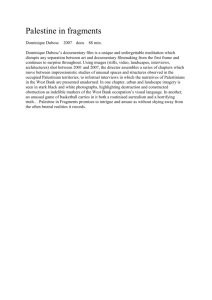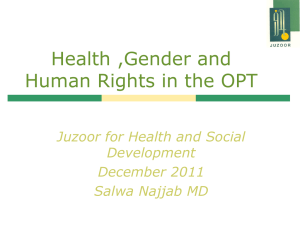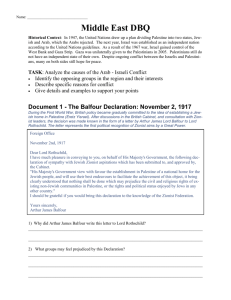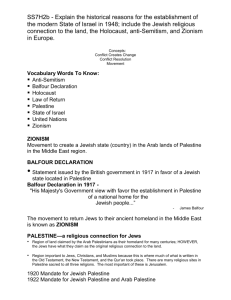Was Balfour Policy Reversible? The Colonial Office and Palestine
advertisement
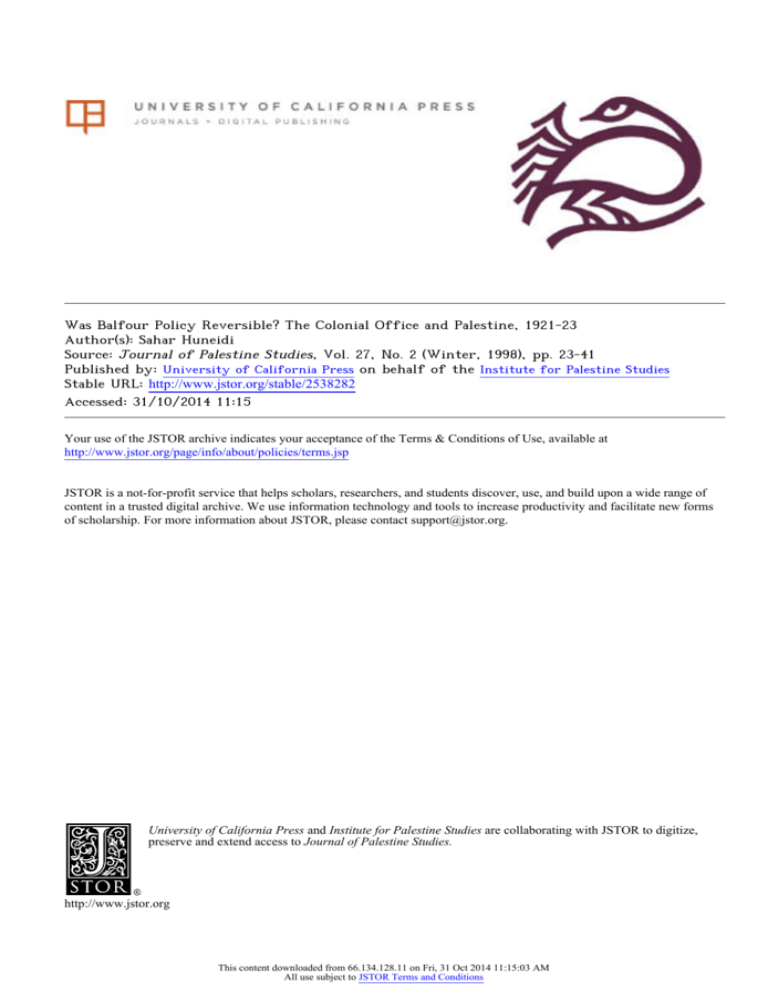
Was Balfour Policy Reversible? The Colonial Office and Palestine, 1921-23 Author(s): Sahar Huneidi Source: Journal of Palestine Studies, Vol. 27, No. 2 (Winter, 1998), pp. 23-41 Published by: University of California Press on behalf of the Institute for Palestine Studies Stable URL: http://www.jstor.org/stable/2538282 . Accessed: 31/10/2014 11:15 Your use of the JSTOR archive indicates your acceptance of the Terms & Conditions of Use, available at . http://www.jstor.org/page/info/about/policies/terms.jsp . JSTOR is a not-for-profit service that helps scholars, researchers, and students discover, use, and build upon a wide range of content in a trusted digital archive. We use information technology and tools to increase productivity and facilitate new forms of scholarship. For more information about JSTOR, please contact support@jstor.org. . University of California Press and Institute for Palestine Studies are collaborating with JSTOR to digitize, preserve and extend access to Journal of Palestine Studies. http://www.jstor.org This content downloaded from 66.134.128.11 on Fri, 31 Oct 2014 11:15:03 AM All use subject to JSTOR Terms and Conditions WAS BALFOUR POLICY THE COLONIAL PALESTINE, OFFICE REVERSIBLE? AND 1921-23 SAHAR HUNEIDI Thispaper focuses on theroleplayed by theMiddle East Department of Britain's Colonial Officein shaping Palestine policy from early 1921 to September1923, when theMandate for Palestine tookeffect. It shows the department'seffortsto neutralize thegrowingdomestic theconchallengesto theJewishnational homepolicy and highlights Arab delethe successive of treatment the department's trastbetween gations and theprivilegedaccess accorded to theZionists.It concludes thatif therewere timesduring thisperiod thatthepolicy could have been overturned,the effortsof the Middle East Department were largelyresponsiblefor keepingit on course. DESPITE THE LLOYD GEORGE GOVERNMENTS FIRM EMBRACEof the BalfourDecla- ration as officialpolicy, the firstyears of Britishrule in Palestine were The JaffariotsofMay 1921,aftera yearof markedby a degree ofuncertainty. calm,showed the extentto whichtheArabswere unreconciledto the "Jewish nationalhome" called forin the BalfourDeclaration.The Britisharmy, of whichhad remainedin Palestineas a securityforceaftertheestablishment in July1920, was openly anti-Zionist.The British the Civil Administration favorableto theJewishnationalhome policy,had by theearly press,initially skepticalifnothostile,and a movementopposed 1920sbecome increasingly to the BalfourDeclaration was gaining ground withinparliament.When, againstthisbackground,a Conservativegovernmentcame to power at the end of 1922,thereseemed a real possibilitythatthe pro-Zionistpolicycould be reversed,and a spate of governmentinquiriesintothatpolicy continued well into 1923. Yet in Septemberof thatyear,the Mandate forPalestinewhich specificallyenshrinedthe BalfourDeclaration-officiallycame into force and became law when it was ratifiedby the League of Nations. Whateveractive lobbyingforchange withinBritaintherehad been, effectivelywas over. Thisarticleexaminesa largelyignoredaspect of thisearlyperiod:therole playedby theMiddleEast DepartmentoftheColonial Officein keepingBritain's pro-Zionist policy on course. In so doing, it also may shed light on the is currently ofManchester, fromtheUniversity who holdsa Ph.D.in history inKuwait.This and Letters Arts, attheNationalCouncilforCulture, ofpublications director articlehasbeen adaptedfroma muchlongerchapterin herbook,A BrokenTrust:Herbert withI. B. Tauris. Samuel,Zionismand thePalestinians(1920-25), forthcoming SAHAR HUNEIDI, JournalofPalestineStudiesXXVII, no. 2 (Winter 1998), pp. 23-41. This content downloaded from 66.134.128.11 on Fri, 31 Oct 2014 11:15:03 AM All use subject to JSTOR Terms and Conditions 24 OF JOURNAL PALESTINE STUDIES interactionin the policy-makingrealm between politicaldecision makers, permanentcivil servants,the parliament,and lobbyinggroups thatis not withoutrelevancetoday. THE MIDDLE EAST DEPARTMENT The MiddleEast Departmentwas createdin February1921 at theinitiative of Sir WinstonChurchill,who had just become colonial secretary,to take over responsibility fortheArabic-speaking areas thatcame underBritishrule at the end of World War I. As such responsibility had previouslybeen divided betweentheForeignOffice(Palestine,Egypt,theHijaz,and Aden) and the India Office(Mesopotamiaand Arabia),a singledepartmentin the Colostandnial Officerepresenteda considerableadvance froman administrative from of theaegis theForeignOfficeto point.For Palestine,however,transfer Whereastheforeignsecretary, theColonial Officehad politicalramifications: LordCurzon,was thesole memberofLloydGeorge's cabinetwithextremely strongreservationsabout theJewishnationalhome policy and had fought of the term,1Churchto apply themostrestrictive strenuously interpretation ill was an unwaveringsupporterof Zionism.Despite Curzon's misgivings, the BalfourDeclarationhad been endorsed at the San Remo conferenceof April1920 and figuredin the August1920 Treatyof Sevresformallyentrustby the ing to Britainthe Mandate forPalestine-which awaited ratification incorporatedin the writof League of Nations.The declarationwas further the Mandate,successive draftsof whichwere still,at the timeof the department'screation,undergoingrevision. Withregardto Palestine,the Middle East Department'staskwas to oversee and carryout Britain'spolicy there,actingas linkbetween the policyin Palestine.Headed by Sir makersin London and the CivilAdministration had been establishedinJuly1920 to HerbertSamuel,theCivilAdministration rulein place since Britain'sconquest of Palestinein 1918 replace themilitary and was specificallyentrustedwith carryingout the BalfourDeclaration's promise of a "Jewishnational home." In appointing Samuel-who had helped the Zionists secure the BalfourDeclaration and had represented them at the Paris Peace Conferencein January1919 alongside the Zionist had leader Chaim Weizmann2-Prime MinisterLloyd George "deliberately" who "would tryto make chosen as highcommissionera Zionistsympathizer a success of the Zionistprogramme."3 in Palestine,where the threemost In contrastto the civil administration were held avowed important positions by Zionists,4theMiddleEast Departcareercivilservantsdrawnfromvariousgovmentwas staffedby traditional ernmentoffices.To head the new department,ChurchillbroughtSirJohn EvelynShuckburghfromthe India Office,where he had served fortwentyone years.HubertYoung, an Arabistand Middle East expertfromthe Foreign Office'sEasternDepartmentwho had servedwithT. E. Lawrence,was officially jointassistantsecretarybut in effectthe "second in command,"and This content downloaded from 66.134.128.11 on Fri, 31 Oct 2014 11:15:03 AM All use subject to JSTOR Terms and Conditions WAS BALFOUR POLICY REVERSIBLE? 25 Lawrence himselfjoined the departmentas politicaladviser.Others came fromthe Treasury,the War Office,the Mesopotamiansection of the India Office,and the Foreign Office.5Of the senior staff,only Colonel Richard Meinertzhagen,the militaryadviser,was a declared Zionist,thoughhis passion was such thatthe Palin It was Weizmannwho Commission,set up to look into the causes of the informedForeignOffice 1920 Easterriotsin Jerusalem,saw fitto devote long staffofBritain'sdecisionto passages to himin itsfinalreportofJuly1920.Among replacethe military other things,the report called Meinertzhagenthe administrationin Palestine "chiefsupportof the Zionists"and "Dr. Weizmann's witha civiladministration. nominee"whose "definiteanti-Arabbias and a prejudice in favourof Zionism... revealhim as an agentwho, however capable of doing good workin otherspheres,is singularlyout of place in the East."6 Meinertzhagenlaterbragged thatsoon afterjoining the departmenthe succeeded in convertingHubertYoung and JohnShuckburghfromArabists to Zionists,7a claimthatboth certainly would have disputed.Nevertheless,it is truethatin the summerof 1921,withinmonthsof the department'sestablishment, Young drew up a memorandum,which Churchillcirculatedto the cabinet,advocating,among otherpolicies favorableto the Zionists,the removal of all anti-Zionist civilofficialsfromthePalestineadministration.8 And whileYoung apparentlywas shakenduringhis visitto Palestinethatautumn at theextentto whichthePalestinianshad lostall confidencein the "straightforwardness"of the Britishgovernment,9 back in London he continuedto push stronglythe policy he had describedas so unpopular. As forShuckburgh,he was no Zionistbut fromthe beginningwas driven by the convictionthatBritainwas dutybound to uphold the Balfourpolicy, insistingthatthispolicy would not lead to a Jewishstate.10These were undoubtedlysincerebeliefs,but thereis also no questionthathe was manipulatedbyWeizmann,who was ubiquitousin theearlyyearsto thepointthatit was he who informedForeignOfficepersonnel,in a telegramsentfromthe San Remo conference,of Britain'sdecisionto replace themilitary administration in Palestine with a civil administration.1" By his own testimony, when the latterwas in England,12 Shuckburghsaw Weizmann "constantly" and Weizmann'sbiographerspeaks of Shuckburgh's"unusualdeference"to him.13Weizmannhad only to threatento resignfromthe ZionistOrganization,thusleavingthemovementin thehands of the "extremist elements,"for Shuckburghto bend over backwardto give him his way.14 REPORTS FROM THE FIELD Whetherout of convictionor as a matterof turf,the Middle East Departmentfromthe outsetseemed intenton downplayingreportsfromthe field, mostlyfromthe Britishmilitary,concerningArab anger and discontent. Thus,when preparationswere underwayforthe Cairo Conferencecalled by Churchillin March1921,Palestinewas on the agenda alongside Mesopota- This content downloaded from 66.134.128.11 on Fri, 31 Oct 2014 11:15:03 AM All use subject to JSTOR Terms and Conditions 26 OF JOURNAL PALESTINE STUDIES mia and Transjordan, buttheMiddleEastDepartmentinsistedthatnothingin Palestinerequiredany attention.15 Yet, the departmenthad been privyto numerouswarningsabout the imminentdangerof disorder,includinga December 1920 reportto the War Officeby the directorof military operations statingthat riotswere likelyto break out in Jerusalem,Jaffa,Haifa, and Nablus.16 The Jaffariots,the intensity of which shocked the civilauthorities, broke out scarcelytwo monthslater.Asked by Young to commenton the situation in Palestine,General Congreve,commanderof the Britishforcesin Egypt and Palestine,wrotein June 1921 thatthe riotswere neitherorganizednor premeditatedand that"unlessArabaspirationsare attendedto ... and Zionistaspirations... greatlycurbed,"itwould notbe surprising ifsomethingyet more seriousdeveloped. AfternotingthatSirHerbertSamuel had "seen and heard onlywhat he wanted to see and hear" and indeed resentedwarnings of the growingArab discontent,he concluded: Whatwe have got to face is the factthatas long as we persist in our Zionistpolicy we have got to maintainall our presentforcesin Palestineto enforcea policyhatefulto the greatmajority... 17 The Middle East Departmentreceived at the same timea similarletterfrom AirVice MarshalSalmond,18and in Julyanotherintelligencereportwarned thattheprestigeofthegovernment was decliningrapidlyand thattheimmediate renewal of disturbancesmightbe triggeredat any momentby "any action"of the government.19 The Middle East Departmentappeared to view such reportsas an intrusion into its domain.MeinertzhagendismissedGeneral Congreve,the most seniorBritishmilitary commanderin the Near East,as a "partisanprovocateur."20Even T. E. Lawrence,the department'spoliticaladviser,conjectured "a personal bias behind [Congreve's]opinions."21 Commentingon yet anothermilitaryintelligencereportnotingthatthe in Palestinewas "unpopular,"22 civiladministration the department'sGerard Clauson wrotein a minutedated 24 Augustthatit was "mostobjectionable that'poison gas' of thisnatureshould be produced in Palestineand reach otherCabinetMinisterswithoutthisofficeor the PalestineGovernmentseeNot surprisingly, the reportwas labelled "inaccurate"and ing it first."23 quicklypassed intooblivion.A monthlater,Meinertzhagenaccused Military Intelligenceof "in effect'spying'upon the Government,"adding thatthe "sooner this departmentbecomes a branch of the civil administration, the better."24 HubertYoung had alreadycounseled thattheBritishmilitary force in Palestinebe separatedfromthe Britisharmyin Egypt.25 Tension over the militarycame to a head when Samuel forwardedto Churchilla copy of a circulardated 29 October 1921 fromthegeneralofficer of theEgyptianExpeditionary Force to the generalofcommanding-in-chief This content downloaded from 66.134.128.11 on Fri, 31 Oct 2014 11:15:03 AM All use subject to JSTOR Terms and Conditions WAS BALFOUR POLICY REVERSIBLE? 27 ficercommandingtroops in Palestine.The circularnoted, interalia, that while the armyofficially was supposed to be apolitical, In the case of Palestine these sympathies[of the British troops]are ratherobviouslywiththeArabs,who have hitherto appeared to the disinterestedobserverto have been the victimsof an unjustpolicy,forcedupon them by the BritishGovernment. Althoughthe circularalso noted thatwhateverthe justiceor injusticeof the policy, the government'sintentionshad been honest,26the tone was found extremelyoffensive.Meinertzhagenwanted to make an issue of it with the War Office.Weizmann,who had obtained a copy and sent it to commentedthatit was the worstof all the "wicked" Lloyd George,bitterly that had been done to theZionistsin thelastsix months.Interestingly, things the War Officewiththismatter, Shuckburghcounseled againstconfronting because "the latterwould be sure to ask us what were the particular passages to which we objected and what were the precise groundsof our objections.I do not thinkthatit would be veryeasy to answer."27 In anyevent,thesewere thefinaldays of Britishmilitary oppositionto the to asChurchillinvitedtheAirMinistry pro-Zionistpolicy.Shortlythereafter, of a forthe defense Palestine, step thatpreventedany sume responsibility AirVice between the military and the CivilAdministration.28 futurefriction MarshalSalmond alreadyhad been reportedby HubertYoung to be "very anxious thathis officersshould not interfere undulyin politicalmatters."29 THE FIRST ARAB DELEGATION In the wake of the Jaffariotsin May and encouraged by an important speech by Samuel on 3 June 1921 assertingthatthe BalfourDeclarationdid not mean thatPalestinewould be taken away fromPalestine'sArabs and an Arabdelegationproceeded to London in thehope of "givento strangers," bringingabout a change of policy. Even before the delegation arrived,Shuckburghhad spelled out, in a memorandumdatedAugust1921,theline thatwas to be takenwhen dealing withit.The Arabs"mustaccept as the basis of all discussion"thatitwas the "fixedintention"of the Britishgovernmentto fulfilits pledges in the matter of a nationalhome fortheJews.30 of the establishment Given thisbasis, it is not surprisingthatthe talks did not make strong headway. In an exhaustive draft statementdated 7 November 1921, Shuckburghassertedthatsince theArabsfailedto realize thatabandonment of the BalfourDeclarationwas "out of the question,"any discussion with themin London was "a mere waste of time."It had been explained to the Arab delegation"overand over again" thatthe presentpolicy was a "chose jugee." He noted thatthe governmentwas "deeply pledged to the Zionists This content downloaded from 66.134.128.11 on Fri, 31 Oct 2014 11:15:03 AM All use subject to JSTOR Terms and Conditions 28 OF JOURNAL PALESTINE STUDIES and have always made it clear to the Arabsthatthereis no prospectof our waveringon thispoint."31Experiencehad shown thatthe Arab delegation was "a hopeless body to deal with":first,hardlyany of them could speak second, they English,and everything had to be translatedby an interpreter; were "veryslow of understanding, and probablyrathersuspicious of one another."Aftermuchinconclusivetalk,"theygo back to theirHotel and wait tillone of theirEnglishadviserscomes and tellsthemwhat to say."He concluded that the time has come to leave off arguing and announce what we propose to do. Being plainlyand authoritatively Orientals,theywill understandan order;and if once they realise that we mean business, may be expected to acquiesce.32 Shuckburgh'smemorandumof 7 November 1921 provides an illuminating contrastbetween the Middle East Department'sdealingswiththe Zionists and the Arabs.Afterdismissingas "groundless"Arab fearsof "Jewish politicalascendancy,"Shuckburghpraised the recent Zionist Congress at Carlsbad forits "wise and statesmanlike"language. He did allude to "less responsible"utterancesmade by some Zionists,but added, in termsstrikinglyreminiscent oftheapproach thatwould hold sway some threequarters of a centurylater: Provocativelanguage is bad, but provocativeaction is far worse. And it is here thatI have a plain word to say to the Arab leaders. As you all know, therehas recentlybeen a further outbreakof violence in Palestine,aftera lapse of six monthssince theJaffadisturbances.These outbreaksmust stop; and I musthold the Arab leaders responsibleforseeing thattheystop.33 Shuckburghwas, however,willingto placate the Arabs on trivialissues. When two membersof the delegationapproached him about a questionregardingthe Greek Orthodox Patriarchatein Jerusalem,he minutedthatit would be worthwhileto convey the Arab suggestionprivatelyto the civil secretaryin Palestine,since "If we can conciliate these people on minor points,so much the better."34 matter. The department'streatmentof the Zionistswas quite a different On occasion, True, there were complaintsabout Zionist "pushfulness."35 at the therewas a flap about "leaks."36There was also frequentirritation tendencyof "extremeelementsin the Zionistmovement"openly to declare theirintentionto have a Jewishstate.In the above-cited7 November 1921 memorandum,Shuckburghcomplainedthatno sooner had theBritishgiven theArabs"reassuringpromises"thansomebody "getsup at the ZionistCon- This content downloaded from 66.134.128.11 on Fri, 31 Oct 2014 11:15:03 AM All use subject to JSTOR Terms and Conditions WAS BALFOUR POLICY REVERSIBLE? 29 gress and talksabout the privilegedpositionof theJews in a JewishState," thereby"neutralizing"the "effectof our language" and giving the Arabs cause to believe "thatour measured statementsare Therewere complaints mere emptylanguage ...."37 Yet therewas a constantflow of information from about Zionist 'pushfulness" the Middle East Departmentto the Zionists.38At the and leaks,yet therewas a constantflow of same time that Shuckburghwas dealing so sternly information fromthe withtheArabdelegation,he was keepingWeizmann "privately informed"of thedealingsand "solicitedhis MiddleEast Departmentto views" on how the Colonial Officeshould respondto theZionists. Arab demands.39And. durinLg autumn1921. when a sent reviewof immigration policywas called for,Shuckburghconfidentially Weizmann a Colonial Officememorandumsummarizingthe findingsof a Departmentin Palesreporton immigration by the head of the Immigration tinewho had refusedto show it to the Zionists.The ZionistCommissionin Jerusalemsucceeded in obtaininga copy anywayand promptlysentitto its officesin London,40but Weizmannwas on the inside,and actuallyappears in theColonial Office'sreview to have takenpart,at Shuckburgh'sinvitation, Inof immigration policy fromthe inceptionof the CivilAdministration.41 deed, Weizmannwas giventhe draftmemorandumto "comment"on before itwas sent to Samuel.42 A clue as to how Shuckburghcould reconcilehis behaviorwithhis apparand detachment"43can be ently sincere claim to "complete impartiality foundin thatsame 7 Novembermemorandum.Britishpolicyin Palestine,he wrote,was directedto promotethe interests"not of any particularsection" but of the Palestiniansas a whole, "Palestinians"being understoodto mean "notonlythe existingpopulationof Palestine,but also those futurecitizens of the countryto whom the BalfourDeclarationhas promised a National Home."44 discussionswiththe The Arab delegation,duringthe monthsof fruitless Colonial Office,did succeed in developingextensivecontactswithmembers oftheBritishestablishment. The MiddleEastDepartmentdid whatitcould to inhibitsuch interaction, sending numerouslettersto highlyplaced British statesmenwhom the Arabswere tryingto contact.Letterssentat the end of forforeign undersecretary October 1921 to LordRobertCecil,parliamentary and theDuke ofAtholl,forexample,statedthatnegotiationswiththe affairs, and thatmeanwhile,"theDelegation Arab delegationwere at a "standstill" has been canvassingvarious persons of influencein the hope of receiving theirhelp or support"and Churchilldid not advise that they should be granted"any interviewsas theyask for."45A letterto Lord Southborough carriedthe same message.46 Aroundthe same time,followinga Times storyon 16 November 1921 about a luncheongivenby theArabdelegationat whichLordSydenhamhad said that"theJews had no more rightto Palestinethanthe descendantsof theancientRomanshad to thiscountry,"47 Meinertzhagendispatcheda min- This content downloaded from 66.134.128.11 on Fri, 31 Oct 2014 11:15:03 AM All use subject to JSTOR Terms and Conditions 30 OF JOURNAL PALESTINE STUDIES ute to Shuckburghrecordingthe names of the luncheon guests,all highrankingBritishofficersand administrators, and thencommented: It is idle to suppose thattheywere notaware ofthepolitical significanceof the luncheon party,where theirpresence constitutedan act of sympathywith the Arab delegation, and does in factconstitutean act of obstructionto the Governmentpolicy.48 in a memorandumto thecolonial secretary Shuckburgh, while remarking thattherewas "nothingcriminal"in acceptingan invitationto lunch,added thatthe presence of high-ranking officers"atwhat was, in effect,a meeting and cannotfail to protestagainstthepolicyofH.M.G.is certainly unfortunate to produce an undesirableimpression."49 OPPOSITION AT HOME Domestic oppositionto Britain'spolicyin Palestinefocused on two main themes:its tax implicationsand the promises made by Britain(as represented by SirHenryMcMahon) to the Arabs (as representedby SharifHussein of Mecca) in the famed 1915 correspondence.These promises were argued to be in directcontradictionto the Balfourpledge made two years later. It was the potentialtax burdenthatwas the earlierfocus of public scrutiny,being takenup by the press withinmonthsof theJuly1920 establishin Palestine. On 5 February 1921, for ment of the Civil Administration example,theDaily Express wrotethatthe termsof the Mandatemade clear the extentof the financialburden at a timewhen the Britishpeople were tradeand widespread already"crushedby taxation,oppressed by restricted and thattherewas no reason whyBritainshould squander unemployment," resourcesin the "aridwastes of the Middle East."50Despite the March1921 conferenceconvened by Churchillin Cairo aimed at reducingimperialexpenditurein the Middle East,51the press continued on this theme. The Times,which initiallyhad supportedthe BalfourDeclaration,by 1922 was raisingthe question of whetherBritaincould affordit.52 Withdomesticopposition to the government'sinvolvementin Palestine increasing,ChurchilltelegraphedSamuel on 25 February1922 requestinga cut in the expenditureon the new Palestinegendarmerieand noting: In bothHouses ofParliamentthereis growingmovementof hostility, againstZionistpolicy in Palestine,which will be stimulatedby recentNorthcliffe articles.53I do not attach undue importanceto thismovement,but it is increasingly to meettheargumentthatitis unfairto ask theBritdifficult This content downloaded from 66.134.128.11 on Fri, 31 Oct 2014 11:15:03 AM All use subject to JSTOR Terms and Conditions WAS BALFOUR POLICY REVERSIBLE? 31 ish taxpayer,already overwhelmedwith taxation,to bear the cost of imposingon Palestinean unpopularpolicy.54 In an effort to quell oppositionto the pro-Zionistpolicyboth in Palestine and at home and in preparationforthevote on theMandateby theLeague of NationsscheduledforJuly,Colonial SecretaryChurchillissued theWhitePaper of 3 June1922,writtenby Samuel in collaborationwithShuckburgh.The paper,even while statingthattheJewswere in Palestine"as of rightand not on sufferance," placed limitson the definitionof theJewishnationalhome and statedthatthe Britishgovernmentdid not contemplatethe "disappearance or subordination"of the Arab population.Neitherthe Arabs nor their supportersin Englandwere mollified,and less thanthreeweeks later,on 21 June,a motionwas introducedin theHouse of Lordsrejectinga Mandatefor Palestinethatincorporatedthe BalfourDeclaration.Lord Islingtonargued that a Mandate based on the Balfour Declaration directlyviolated the pledges made by the Britishin 1915 to SharifHussein as well as those made by General EdmundAllenbyin his Declarationto the Palestinianpeople in withtheTurksended.55Notingthatthegreatmajority 1918,afterthefighting oftheinhabitants opposed theBalfourDeclaration,he urgedthatacceptance by the League of Nationsbe postponed untilmodificationscomplyingwith those pledges were made.56The motioncarriedby a vote of 60 to 25, causing Young to minuteon 23 June: Yesterday'sdebate in the House of Lords will have encouraged the Arab delegationto persistin theirobstinate attitude,and unless the Lords' resolutionis signallyoverruled by the House of Commons and the Council of the League of Nations,we mustbe preparedfortroublewhen the Delegation gets back to Palestine.57 In the event,the Lords'resolutionwas "signallyoverruled."Althoughoppositionin the House of Commons had been mounting,and a numberof passionatespeeches againstthe pro-Zionistpolicywere made duringitsdebate on 4 July,Churchillmanaged to carrythe day by convincingthe members of parliamentthathe had cut the cost of maintainingPalestinefrom?8 millionin 1920 to an estimated?2 millionin 1922.58WithCommonsvoting in favorof the policy,the way was open forthe League of Nationsformally to approve Britain'sMandateforPalestineon 24 July. A NEw GOVERNMENT maintained Shuckburghand theMiddleEast Departmenthad consistently thatBritain'scommitment to the BalfourDeclarationwas a closed issue, a "chosejuge'e." In fact,skepticismwithinthe governmenthad accompanied the policyfromthe outset:As earlyas March 1920,when Palestinewas still This content downloaded from 66.134.128.11 on Fri, 31 Oct 2014 11:15:03 AM All use subject to JSTOR Terms and Conditions 32 JOURNAL OF PALESTNE STUDIE underForeignOfficecontrol,a minuteby HubertYoung demonstratedthat the possibilityof "abandoning"the government'spro-Zionistpolicy was a recurring themein officialcircles.59Nor did the League of Nation'sratification of the Mandate close the debate: As Porathpoints out, if Britainhad decided to change itspolicy on the BalfourDeclarationand made changes in thewritof theMandate,itis "highlydoubtful"thattheLeague would have opposed it.60Indeed, seldom had Britain'spolicyin Palestineseemed less of a chosejuge'e thanduringthe firsthalfof 1923,when the entiregovernment seemed occupied withdelvinginto itsveryfoundations. The triggerto thisdeep probingwas the October 1922 fallof the governmentof Lloyd George,who had been deeply committedto the pro-Zionist of a new governmentfollowingtheoverwhelming policy,and theformation electoralvictoryin November of the Conservatives,where an anti-Zionist currentwas strong.In a debate in theHouse ofLordson 27 March1923,Lord Islingtonremarkedthat"Zionistpolicyin Palestinecontributeditsshare,and It assisted no small share,I think,to the downfallof the late administration. correspondinglyin the accession to power of the presentadministration." Notingthatthereare "manygentlementoday occupying quite prominent positions in His Majesty'sGovernmentwho were last year and the year beforeamong the most active and vehementassailantsof Zionistpolicy in Palestine,"he concluded thatthis"would constitutea stronggroundforearly 61 Indeed, such a considerationwas considerationof the whole policy. alreadyunderway,and somethingof theclimatethatfollowedthe formation of the new governmentis conveyed in a lengthysecretmemorandumentitled "Policy in Palestine" submittedto the cabinet on 17 February1923, which declared: If there is to be a change of policy, the sooner it is announced the better.The presentstateof suspense is fairto nobody. It is not fairto allow theJews to go on collecting moneyfortheirprojectsin Palestineifthereis any question of non-fulfillment of thepledge on whichtheseprojectsare based. It is not fairto theArabs,ifwe mean to maintainour policy,to allow themto continuean agitationwhich may develop into action forwhich theywill sufferin the long run. 62 Throughoutthis period, the Middle East Department,and particularly directeda steadystreamofmemorandaat thenew colonial secShuckburgh, theDuke of Devonshire,who unlikehis predecessorChurchilllacked retary, firmconvictionson thesubjectofPalestine.Two messages in particularwere drivenhome repeatedly:thatif Britainfailedto honor its pledge "We certainlyshould standconvictedof an act of perfidyfromwhichitis hardlytoo much to say thatour good name would neverrecover,"63and thatthe "real alternative"facingthe governmentwas between "complete evacuation or This content downloaded from 66.134.128.11 on Fri, 31 Oct 2014 11:15:03 AM All use subject to JSTOR Terms and Conditions WAS BALFOUR POLICY REVERSIBLE? 33 continuingto honor the Zionist pledge."64The influenceof such memoranda on Devonshirewas considerable.65 Not long afterthe new governmenttook office,Shuckburgh,anticipating new inquiries,took it upon himselfto look into the originsof the Balfour Declaration.The inquirywas remarkableespeciallyforthe dearthof official documents on the subject that it uncovered. Althoughhe combed the records,he foundnothingthatshed lighton the earlierhistoryof thenegotiations leading up to the BalfourDeclaration.66Balfourhimself,pressed by Shuckburgh,pleaded a bad memoryand regrettedthe death of Sir Mark Sykes,who "had the whole thingat his fingerends."67The "mostcomprehensiveexplanation"oftheoriginoftheBalfourDeclarationthattheForeign Officewas able to provide was contained in a small "unofficial" note affirming that"littleis knownofhow thepolicyrepresentedby theDeclaration was firstgivenform.... Negotiationsseem to have been mainlyoral and by means of privatenotes and memorandaof which only the scantiestrecords are available,even ifmoreexists."68Shuckburghthenturnedforhelp to Wilof stateforthe colonies, who wrotehis liam Ormsby-Gore,undersecretary own recollectionoftheevents,whichhe had witnessed,in a one-page memorandum,thelastparagraphofwhichnotesthatitwas he who, togetherwith Colonel L. S. Amery,had actuallydraftedthe BalfourDeclarationin itsfinal form.69Given the lack of documentation,Shuckburghwas able to develop his own interpretation (certainlyinfluencedby Ormsby-Gore)in his memorandum"Historyof the Negotiationsleading up to the BalfourDeclaration," whichemphasizedthe diremilitary straitsin whichBritainfounditselfat the timethe declarationwas draftedand itsdebt to the Zionistsfortheirhelp in thistimeof need.70Colonial SecretaryDevonshirehad the 10 January1923 to thecabinetalong memorandumprintedas a cabinetpaper and distributed note declaringthatthetimehad come when theattention witha handwritten of thecabinet"shouldbe directedto thisaspect of thePalestinequestion."71 A morefar-reaching and explicitinquirywas demanded ofthe cabinetby Devonshire in his covering note accompanyingthe Middle East Department'slong 17 Februaryreporton policyin Palestine.By thattime,thelongover the McMahon pledges had reached new levels simmeringcontroversy of public debate, a factreflectedin the secretary'snote to the cabinet.Thus, afterurgingthat"a definitestatement"on Britain'spolicy be made with"as littledelay as possible,"he suggestedthatthe cabinetfocus on threequestions:(1) whetheror notpledges to theArabsconflictwiththeBalfourdeclaration;(2) ifnot,whetherthe new governmentshould continuethe policy set down by the old governmentin the 1922 WhitePaper; and (3) if not, what alternative policy should be adopted.72 THE MCMAHON PLEDGES Itwas thearrivalin London on 24 December 1922 of a second Arabdelegation,actingupon advice fromEnglishsupportersheartenedby thechange This content downloaded from 66.134.128.11 on Fri, 31 Oct 2014 11:15:03 AM All use subject to JSTOR Terms and Conditions 34 JOURNAL OF PALESTINE STUDIES in government,thatbroughtthe issue of Britain'swartimepledges to the Arabsback to centerstage.Immediatelyupon arrival,thedelegatesset out to meetrepresentatives oftheMorningPost,theDaily Mail, and the Timesand distributed copies of the Hussein-McMahoncorrespondence. The cruxof thecontroversy over the correspondencewas whetheror not Palestine had been included in the areas Britainhad promised the Arabs would become independentafterthe war. McMahon's letterto SharifHussein had explicitlyexcluded "portionsof Syria,lyingto the west of Damascus, Homs, Hama, and Aleppo." The Arabsand theirsupportersarguedthat Palestinelies well south of these areas, which accordingto themhad been excluded because of Frenchintereststhere. The Middle East Department,ever since its establishment, had wrestled withthisissue, as seen in a flowof minutesand memorandaon the subject as of 1921.73 Unsuccessfulin itsefforts to demonstratepersuasivelythatPalestine was not covered by the promise,the departUnsuccessfulin its efforts mentconcentratedon tryingto keep the issue from to demonstratethat public scrutiny. Thus,fivedays aftera 6 January1922 Palestine was not covered minuteby S. M. Campbell,assistantprincipalof the by theMcMahonpledge, Colonial Office,statedcategorically(citinga Foreign thedepartment Officememorandum)that"geographicallyPalestine is included in the area withinwhich Britainwas to concentratedon tryingto keep the issuefrompublic acknowledge Arab independence,"74 Shuckburgh had minuted that though "the view taken in this scrutiny. Officehas been thatPalestinewas so excluded, but thereis sufficient doubt in the matterto make it desirable not to drag the controversy out into the daylight."75 Shuckburghresponded similarlywhen SirHerbertSamuel,havingheard thatShuckburghhad soughtand obtainedan explanationof thematterfrom SirHenryMcMahonhimself,76 pressed the Middle East Departmentin a letterof 6 August1922 to publishthe explanationso thatthe Arabswould accept once and forall the faitaccompli thatPalestinewas excluded fromthe pledge. Samuel's request,comingtwo monthsaftertheWhitePaper had addressed the McMahon pledges at some length,shows how inadequate the latter'sexplanationhad been. In his belated replyto Samuel dated 7 Novemwho in themeantimehad receivedcriticalcomments ber 1922,Shuckburgh, on McMahon'sexplanation,77statedthathe was "ratheragainstmakingany further public announcementson thistroublesomequestion,"and that"indeed itseems to me thatour best policyis to letsleepingdogs lie as much as possible."78 The publicationin the Britishpress in early 1923 of partsof the correspondence, provided by the second Arab delegation,revivedpreciselythe kindof public scrutinytheMiddle East Departmenthad triedso assiduously to avoid. In January,J. M. N. Jeffries, the Daily Mail correspondent,published a series of articlescalling foran evacuation fromPalestine and the abolitionof the BalfourDeclaration.79Soon after,Lord Sydenhamproposed This content downloaded from 66.134.128.11 on Fri, 31 Oct 2014 11:15:03 AM All use subject to JSTOR Terms and Conditions WAs BALFOUR POLiCY REVERsIBLE? 35 a parliamentary questionin theHouse ofLordsaskingthegovernmentto lay on the table the entirecorrespondenceon which the previousgovernment had based its contentionthatPalestinewas geographicallyexcluded from the pledges, promptinga flurry of memorandain the Middle East Department. R. C. Lindsay, undersecretaryof the Foreign Office, replied to Shuckburgh'surgentquery on the subject on 19 February1923 that "we should not be likelyto strengthen our case by publishingthe McMahonletmiters."80On 21 February,SydneyMoody,a seniorColonial Officeofficial, the correspondence "remain nuted that the reasons for not publishing good,",81while Young minutedon the same day that"thebest counterblast to argumentsbased on the McMahon correspondencewould be the signatureand publicationof a TreatywithKingHussein in which he accepts our positionin Palestine."82 The debate in the House of Lords took place on 1 March 1923. Lord Sydenhamrequestedpublicationof thecorrespondenceon thegroundsthat thepublichas therightto know "exactlyhow our nationalobligationsstand" withregardto theArabs.In an exceptionallycogentsummationof thetopic, he rehearsedin detail-and withlong verbatimquotes fromthe versionof the correspondencethathad been made available-the entirehistoryof the was his interesting McMahon pledges and those thatfollowed.Particularly meticulousand scathingdeconstructionof the theory"invented"in the White Paper to explain Palestine's alleged exclusion from McMahon's pledge.83 Colonial SecretaryDevonshire,who was presentat the debate, was too shrewdto addressdirectlytheargumentsraisedbutconfinedhimselfto reafin broad termshis acceptance of theWhitePaper's explanation.Folfirming lowingthe advice of the Middle East Department,he deftlyavoided making available ("much as I regretit") any of the correspondenceon the grounds to the thatpassages not relatingto the controversycould be "detrimental public interest."When asked whetheronly those passages relatingto the customagainst correspondencecould be published,he cited parliamentary partialpublications.84As to Lord Sydenham'srequest thatDevonshire at of the numerouspassages cited in the least commenton the authenticity course of the debate, Lord Devonshirequite simplyignoredit. Anotheraspect of the examinationof statepolicy on Palestineinvolved themilitary dimension.InJanuary1923,the GeneralStaffof theBritishArmy declaredthatPalestinewas of no strategicvalue in defendingtheSuez Canal. Doubtlessin the aim of counteringthisview, Shuckburghrequestedthe department'smilitary adviser,Meinertzhagen,to writea reporton Palestine's gave strategicimportance.Meinertzhagen'sreport,which not surprisingly detailedargumentsas to why its importancewould increase as timewent on,85was producedin May 1923. Shuckburghsuggestedthatitbe submitted to the Committeeof ImperialDefense,which should be invitedto fixa day forthe discussionof the whole question and to determineto what extent, of everykind,"Palestinewas of "quiteapartfrompledges and commitments This content downloaded from 66.134.128.11 on Fri, 31 Oct 2014 11:15:03 AM All use subject to JSTOR Terms and Conditions 36 JOURNAL OF PALESTINE STUDIES strategicvalue to the BritishEmpire.It was decided thatthe subjectshould be discussed withSir HerbertSamuel when he arrivedin London.86In the event,the Committeeon ImperialDefense concluded thatPalestinewas not as importantstrategically as once thought. THE CABINET COMMITTEE ON PALESTINE The futureof Britain'sinvolvementin Palestinewas, finally, decided by a high-poweredcabinet committeeappointed on 27 June 1923 by the new primeminister, StanleyBaldwin.Chairedby Colonial SecretaryDevonshire, the committeeincluded,among others,Lord Curzon of the ForeignOffice; the secretariesof stateforwar,India,and air;the firstlord of the Admiralty; the presidentof the Board of Trade; and the secretaryof the treasury.87 The committeewas chargedwithadvisingthegovernmentto enable itto make a "promptand finaldecision" on Palestine. The committeedeliberatedforone month.Duringthattime,opponentsof thepolicyin theHouse of Lordscontinuedto agitate.Even in theCommons, a groupof 110 Conservativemembersof parliament,"feelingthatthe matter is one offirst class Imperialimportancewithfar-reaching futureresults,"sent now a petitionto the "MiddleEast CabinetCommittee sitting" urgingthatthe "definitePLEDGES" given to the PalestineArabs be fulfilledand thatthe "whole population of Palestine,with its 93 percentArabs,should be consulted, and a form of governmentagreed upon in harmonywith their "to impose on an unwillingpeople ... wishes."Accordingto thepetitioners, theDominatingInfluenceof anotherrace is a violationofnaturalrights"condemned in the covenantof the League of Nations.88 Itwas duringthatsame period thatthethirdArabdelegation,encouraged by the appointmentof the committee,arrivedin London. Even beforethey made an officialrequest to be heard by the committee,Ormsby-Gore,an ardentZionist,wroteto thecolonial secretaryon 19Julythat"I deplore most emphaticallythe idea thatthe CabinetCommitteeshould see those people or make any concessions."89Shuckburghalso weighed against receiving them,notingthatthe delegationwas "in no sense an officialbody and to allow themto appear beforea cabinetcommitteewould be givingthemtoo much importance,"especially as theyrepresented"theextremistsection of the PalestineArabs,who constitutea majorityperhaps,but certainlynot the whole of the Arab population."90However, Shuckburghwarned in another minutethatsince theMiddleEast Departmentwas "constantly representedin the press" as being "whollyunder Zionist influence"and "accused of all kindsof Machiavelliandesignsto preventany but the Zionistview on Palestinianquestionsreachingthe Secretaryof Stateor the cabinet,"care mustbe taken in refusingto allow the Arabs to see the committee.91 When Musa Kazim al-Husseini,presidentof the delegation,wrote fromthe Hotel Cecil on 24 July1923 to thechairmanof the CabinetCommitteethatthepeople of Palestineregardedthe formationof the committee"as a step,on the partof This content downloaded from 66.134.128.11 on Fri, 31 Oct 2014 11:15:03 AM All use subject to JSTOR Terms and Conditions WAS BALFOUR POLICY REVERSIBLE? 37 theBritishGovernment, towardsa fairand equitablesolutionofthePalestine problem,"92Shuckburghinformedthe delegation"thatthe committeewere not hearingoral evidence and accordinglycould not receive them."93 In the end, Sir HerbertSamuel, who had arrivedfromPalestine in late Juneespeciallyfortheproceedings,was thesole outsidewitness.He argued thatindecisionwas inadvisableand thatfromthestandpointof international securityin Palestine,a finaldecision had to be taken.In his two meetings withthe CabinetCommitteeon 5 and 9 July,he arguedthatArabopposition to Zionismwas based to a large extenton a misunderstanding of its goals and thatresponsibleZionistleaders did not intendto confiscateArab lands or flood the countrywithJewishimmigrants. Accordingto Wasserstein,Samuel's "reasonableness"seemed to have won over the doubters on the committee.94 Meanwhile,thefulldetailsof the CabinetCommittee'sdeliberationswere being leaked by Meinertzhagento LeonardStein,thesecretaryof the Zionist Organization,who in turnurgedWeizmann,who was in Europe at thetime, to returnimmediately.95 As soon as Weizmannarrivedin London,on 24 July 1923,he consultedSamuel.The followingday, he went to see Shuckburgh, who reportedin a secret minuteto the colonial secretarythatthe Zionist leader had been "in a greatstateof agitation"by what he believed was the CabinetCommittee'sintentionto propose "freshconcessions to the Arabs," which in his opinion would "further whittledown the BalfourDeclaration and the privilegesofJews in Palestine."He told Shuckburghthat"ifthisapitwould have the effectof breakingup the Zionist prehensionwas fulfilled, Organizationand killing,Zionistactivityin Palestine."96On 26 July1923, Weizmannsenta lengthyletterto the colonial secretaryconcerning"certain aspects of the situationin Palestine,"whichhe ended by saying:"A freshreadjustment,and a re-adjustment involvingthe abandonmentof vitalprinciblow whichmightwell prove fatal"97 to Zionism. ples, would be a shattering The CabinetCommittee'sfinalreport,entitled"The Futureof Palestine," was submittedon 27 July1923. It is difficult to guess what impactthe interventionsofWeizmann,conveyedby Devonshire,mayhave had on thecommitteein buttressing the argumentspresentedby Samuel.At all events,the to blame those who argue committee,even while notingthat"itis difficult ... thatthe entireMandateis builton the fallacyof attempting to reconcile the irreconcilable"(i.e., securing the establishmentof a Jewish national concluded home while safeguardingthe rightsof the country'sinhabitants), along the lines of countless Middle East Departmentmemoranda: that whetherthe policyhad been "wise or unwise,it is well-nighimpossiblefor any Governmentto extricateitselfwithouta substantialsacrificeof consistencyand selfrespect,ifnot honour."98 Four days later,thecommittee'srecommendationswere approved by the cabinet,effectively ending,ifnot oppositionto the policy,at least the prosof it. pects changing When theMandatecame intoforcea few monthslater, in September1923, the matterwas "settled,"and the BalfourDeclaration, This content downloaded from 66.134.128.11 on Fri, 31 Oct 2014 11:15:03 AM All use subject to JSTOR Terms and Conditions 38 JOURNAL OF PALESTINE STUDIES which had been a politicaldocument-in facta letterof intent-acquireda legal status.99 Itwillneverbe knownwhethertheBalfourpolicycould in facthave been reversedthatsummerof 1923.The Zionistsapparentlybelieved thisto be the case. If they are correct,they owe a debt of thanks to the Middle East Department. NOTES 1. Churchill (as war secretary) and Curzonhad been engagedsincemid-1920 in a struggle forcontrolof Britain's Middle Eastpolicy.Churchill wanteda Middle Eastdepartment withintheColonialOffice,whileCurzonfavoredeithera separatedepartment withitsown secretary of stateor,failingthat,ForeignOfficeresponsibility forMiddleEastpolicy.Curzon latercalledtheBalfourDeclarationa "striking contradiction of our publiclydeclaredprinciples." David Gilmour,Curzon (London:JohnMurray, 1994),pp. 522-25.On Curzon'santi-Zionist views, see also Doreen Ingrams, PalestinePapers 1917-1922. Seeds of Conflict (London:JohnMurray, 1989). 2. BernardWasserstein, TheBritishin Palestine.TheMandatoryGovernment and theArab-Jewish Conflict, 1917-1929 (London:Basil Blackwell,1991),pp. 75-76. 3. Elie Kedourie,"SirHerbertSamuel and theGovernment Middle of Palestine," EasternStudies5, no. 1 (January 1969),p. 44. 4. In additionto Samuelas highcommissioner, NormanBentwichwas attorneygeneraland WyndhamDeedes (a GentileZionist)was chiefsecretary. 5. Fortheformation of thedepartment,see HubertYoung,TheIndependentArab (London:JohnMurray, 1933), pp. 323,325;Jeremy Wilson,Lawrenceof Arabia (London:Heinemann,1989),pp. 632-34,643-45.See also JohnMcTague, "British Policyin Palestine"(Ph.D. diss., New YorkUniversity, 1974),p. 235. 6. "Enquiry intoRiotinginJerusalem in April1920"(PalinReport),submitted PortSaid,August1920,PublicRecordOffice [PRO]ForeignOffice[FO] 371/5121 E 9373,pp. 44-46. 7. McTague,"British Policyin Palestine,"p. 298. A Peace to End All 8. David Fromkin, Peace. CreatingtheModernMiddleEast, 1914-1922 (London:PenguinBooks, 1989),p. 524. 9. Ingrams, PalestinePapers,pp. 151-52. 10. Shuckburgh was apparently not privyto theviewsof his superiors. Ata smallgathering on 22 July1922in Lord Balfour'shomeat therequestof Weizmannand attendedby Churchill and LloydGeorge,amongothers,Balfourand LloydGeorgestatedthat"bytheDeclarationtheyalwaysmeantan eventualJewish state."Atthesame meeting, Lloyd that"we" mustnot GeorgetoldChurchill allow representative in Palesgovernment tine.JehudaReinhartz, Chaim Weizmann: TheMakingofa Statesman(New York: OxfordUniversity Press,1993),pp. 356-57. 11. See Minuteby HubertYoung,27 April1920,PRO FO 371/5139.Indicative ofWeizmann'saccess to policymakers is a memohe wroteto ForeignSecretary Curzonadvisingaboutthe"danger"of Arabpersonnelin theadministration in Palestineand counsellingon theadvisaBritish bilityof "infiltrating" Jewsintothe In thesame despatch, administration. WeizmannrevealedthattheZionistOrganizationhad alreadypreparedlistsof availablecandidatesand thattheselists had been submitted to theForeignOffice. 2 March1920,PRO FO 371/5113E 1184. 12. Shuckburgh to Secretary of State, 24 July1924,PRO Colonial Office[CO] 733/86. Chaim Weizmann,p. 13. Reinhartz, 377. 14. See, forexample,Shuckburgh to of State,Secret,25 July1923, Secretary PRO CO 733/54. 15. McTague,"British Policyin Palestine,"p. 239. 16. Ibid.,224. fromGeneralCongreveand 17. Letters AirVice MarshalSalmond,through A. M. This content downloaded from 66.134.128.11 on Fri, 31 Oct 2014 11:15:03 AM All use subject to JSTOR Terms and Conditions 39 WAS BALFOUR PoLICY REVERSIBLE? Trenchard, "Situation in Palestine," 28 June1921,PRO CO 733/17. 18. Ibid. 19. WarOfficeto ColonialOffice, in Confidential Reporton thesituation Palestine, July1921,PRO CO 733/13. 20. Minuteby Meinertzhagen, 29 June 1921,PRO CO 733/17. 21. Minuteby T. E. Lawrence, June 1921,PRO CO 733/17. 22. WarOfficeto Churchill, 15 August 1921PRO CO 733/13. 23. Minuteby Meinertzhagen, 8 September1921,PRO CO 733/13. 24. Ibid. 25. McTague,"British Policyin Palestine,"p. 299,quotingPRO CO 733/14. 26. Samuelto Churchill, 10 November 1921,PRO CO 733/7. 27. Shuckburgh to SirJ.MastertonSmith,1 December1921,PRO CO 733/7. 28. Wasserstein,The British in Pales- tine,p. 107. 29. Minuteby Young,29 June1921, PRO CO 733/17. PalestinePa30. Quoted in Ingrams, pers,p. 139. 31. Memoby Shuckburgh, 7 November 1921,PRO CO 733/15. 32. Ibid. of a Statement to be 33. "Summary made by Secretary of State,"drafted by in November1921,PRO CO Shuckburgh 733/15. 34. Shuckburgh to Clauson,28 November1921,PRO CO 733/15. 35. Forexample,see Minuteby 1 February1924,PRO CO Shuckburgh, to LordArnold,10 733/84;Shuckburgh May1924,PRO CO 733/84;Shuckburgh to Secretary of State,24 July1924,PRO CO 733/86. 36. InJune1922,forexample, Weizmannwas discoveredto have gained and dispatches access to secrettelegrams comingin and out ofthedepartment. Suspicionfellupon Meinertzhagen, thoughhe latterwrotein his diarythathe suspecteda juniormemberof thedepartment,a Jew,ofbeingthesourceof the leak.MarkCocker,Richard Meinertzhagen: Soldier, Scientistand Spy (London:Seckerand Warburg, 1989),pp. 151-52. 37. Memoby Shuckburgh, 7 November 1921,PRO CO 733/15. main38. Meinertzhagen's biographer tainsthat"theflowofinformation be- tweenthemilitary adviserand his close friend, Weizmann,was fargreater" than Meinertzhagen was preparedto admit. Cocker, Richard Meinertzhagen, pp. 151-52. 39. Reinhartz,Chaim Weizmann, p. 359. Reinhartz notesthatthe"relationship nuroftrustthatWeizmannhad carefully turedwithShuckburgh paid off." 40. Ibid.,45-47. 41. MosheMossek,PalestineImmigration Policy Under Sir Herbert Samuel (London:FrankCass, 1978),pp. 44, 48. 42. Weizmannto Shuckburgh, 7 December1921,PRO CO 733/16. to Secretary of State, 43. Shuckburgh 24 July1924,PRO CO 733/86. 44. "Summary of a Statement to Be Made by theSecretary of State,"drafted by Shuckburgh, 7 November1921,PRO CO 733/15. 45. CO to theDuke ofAtholl,27 October1921,PRO CO 733/17. 46. EricMillsto theRt.Hon. Lord Southborough, 29 October1921,PRO CO 733/17. 47. "Futureof Palestine:ArabPlea for FairPlay,"Times,16 November1921,reproducedin PRO CO 733/15. 48. Meinertzhagen to Shuckburgh, 17 November1921,PRO CO 733/15. 49. Ibid. 50. "In theWilderness," Daily Express, 5 February1921. 51. Young,IndependentArab,p. 325. 52. Fromkin,A Peace to End All Peace, p. 525. Britain's 53. LordNorthcliffe, greatest who owned the newspaperproprietor, Times and the Daily Mail, wrote a series of highlycriticalarticlesduringhisvisitto Palestinein early1922. to Samuel,Telegram,Pri54. Churchill vateand Personal,25 February1922,PRO CO 733/18. 55. On 9 November1918,theBritish and Frenchgovernments issueda joint declaration, approvedby U.S. President WoodrowWilson,assuringthepeople of Syria,Palestine,and MesopotamiathatAllied policyaimedat "thesetting up of nationalgovernments and administrations thatshallderivetheirauthority fromthe freeexerciseof theinitiative and choice of theindigenouspopulations." (The declarationwas reproducedin PRO FO 371/ 5036). This content downloaded from 66.134.128.11 on Fri, 31 Oct 2014 11:15:03 AM All use subject to JSTOR Terms and Conditions 40 JOURNAL OF PALESTINE of State,Tele56. Greento Secretary of State,Recordsofthe gram,Department Department ofStateRelatingto Internal Affairs ofTurkey,1910-1929,Microcopy 353,Roll80, NationalArchives. 57. Minuteby Young,23 June1922, CO 733/22. 58. Fromkin,A Peace to End All Peace, pp. 525-26. in Syriaand Pal59. "PoliticalSituation estine,"15 April1920,PRO FO 371/5034 E 3182. 60. YehoshuaPorath,TheEmergence of the Palestinian-Arab National Movement, 1918-1929 (London: Frank Cass, 1974),p. 168. 61. Parliamentary Debates (Lords), to 3 May,1923),pp. vol. 53 (13 February 639-69. Secret,17 62. "Policyin Palestine," February1923,PRO CO 733/58,Cabinet Paper [CP] 106 (23). of State to Secretary 63. Shuckburgh fortheColonies,8 January 1923,PRO CO used thearguments 733/54.Interestingly, by thoseopposed to theBalfourpolicy were almostexactmirror imagesof Lord pro-Zionist arguments. Shuckburgh's in thedebatein theHouse of Sydenham, Lordson 1 March1923,declaredthatthe us verygreatservArabshad "rendered ices duringthewar at a verycriticaltime, and theycertainly believedthatthe was a pledgeto whichI have referred realpledgethatwe shouldhonour." that"ourpledgehas been disCharging tinctly broken,"he urgedthegovernment for to restoreits"tarnished reputation He notedthatbeforetheargood faith." regardedas mistice"we wereuniversally a straight-dealing people whose word was theirbond,"butthatbecause ofthe Balfourpolicy"ourprestigein theNear Eastand farbeyondithas undergonea very dark eclipse." Parliamentary De- to 3 bates (Lords),vol. 53 (13 February May1923),pp. 226-34. to Secretary of State 64. Shuckburgh fortheColonies,8 January 1923,PRO CO 733/54. 65. Porath,forexample,creditsthe withDevonshire'sdecisionto department continuethepolicyof itspredecessor. Porath,Emergence, p. 168. to Ormsby-Gore, 10 66. Shuckburgh January 1923,PRO CO 733/58. STUDIES Leadof theNegotiations 67. "History ingup to theBalfourDeclaration,10January1923,PRO CO 733/58,CP 60 (23). 68. The fulltextof thenotewas includedin SecretCabinetPaperCP 60 (23), "Palestineand theBalfourDeclara1923,PRO CO 733/58. tion,"January 69. Ormsby-Gore's memorandum, dated24 December1922,was printedas partof theSecretCabinetPaperCP 60 (23) in PRO CO 733/58.Thisversion, The however,omitsthefinalparagraph. handwritten facsimileof Ormsby-Gore's minuteis in PRO CO 733/35. 70. In fact,subsequentminutesand memorandasuggestthattheexpected In a minuteto help did notmaterialize. wrote of state,Shuckburgh thesecretary on 8 January 1923:"We made our promise to theJewsat a timeof gravenational we because we thought emergency, mightobtainsome assistancefrom them...."(PRO CO 733/54).On 17 Februby the ary1923,a secretmemorandum of stateassertedthat"These secretary benefitsmayor maynothave been worth securing,and mayor maynothave been actuallysecured;buttheobjectionsto goingback on a promisemade undersuch conditionsare obvious.TheJewswould naturally regarditas an act of basenessif, havingappealed to themin our hourof peril,we were to throwthemoverwhen thedangerwas past.(SecretmemoCP 106(23)in PRO CO 733/58.) 71. SecretCabinetPaperCP 60 (23), "Palestineand theBalfourDeclaration," 1923,PRO CO 733/58. January 72. Secretmemo,17 February1923, PRO CO 733/58,CP 106 (23). to 73. See, forexample,Forbes-Adam 20 October1921, Private, Shuckburgh, to Hogarth, PRO CO 733/38;Shuckburgh Private,12 October1921,PRO CO 733/38; 17 October1921, Hogarthto Shuckburgh, PRO CO 733/38. 74. Minuteby S. M. Campbell,6 January1922,PRO CO 733/8. 11January 75. Minuteby Shuckburgh, 1922,PRO CO 733/8. 76. On 11 March1922,Shuckburgh minutedthatMcMahonhad come to see himthepreviousday and readto himhis in whichhe explanationof his intention, had said thathe meant"toexcludethe whole of Palestinefromthearea in respectofwhichthepledgeofArabindependencewas given"and thathe was This content downloaded from 66.134.128.11 on Fri, 31 Oct 2014 11:15:03 AM All use subject to JSTOR Terms and Conditions 41 WAS BALFOUR PoLIcY REVERSIBLE? "quiteclear"on thatpoint.(Minuteby 11 March1922,PRO CO Shuckburgh, 733/38.McMahon'sletterto Shuckburgh is dated is in thesame file,and,curiously, 12 March1922.) 77. Minuteby EricMills,theacting principalin thecolonialoffice,18 August 1922,PRO CO 733/59. 7 to Samuel,Private, 78. Shuckburgh November1922,PRO CO 733/39. 79. Daily Mail, 9, 10 and 11January 1923. 19 80. R. C. Lindsayto Shuckburgh, February1923,PRO CO 733/55. 81. Minuteby S. Moody,21 February 1923,PRO CO 733/57. 82. Minuteby HubertYoung,22 February1923,PRO CO 733/57.This,in fact, was thecourseadopted,and negotiations offriendship treaty fortheAnglo-Hijaz withSharifHussein,whichlasted 1923and into1924,snagged throughout on thisissue.WhenHusseinbalkedat Arto ticle2, in whichhe was asked in effect policyin Palestine,the recognizeBritain's shortof its decidedthatanything British would be seen as a defeatof formulation theBalfourpolicyand thatwithoutthis had no treaty articletheAnglo-Hijaz was neverconcluded, value.The treaty abandonedHusseinto his and theBritish fatewhenIbn Saud attackedTa'if,the summercapitalof Hijaz,in August1924. See Sahar Huneidi, A Broken Trust.Her- bertSamuel,Zionismand thePalestiniwithI. B. ans (1920-25), forthcoming Tauris. 83. Forthecompletedebate,see ParDebates (Lords),vol. 53 (13 liamentary to 3 May1923),pp. 226-34. February 84. Ibid. by Meinertzhagen, 85. Memorandum in Palestine,"14 Importance "Strategical May1923,PRO CO 733/54. Imon Strategical 86. Memorandum portancein Palestineby Meinertzhagen, 14 May1923,PRO CO 733/54; of Stateand to Secretary Shuckburgh 17 May1923,PRO CO Ormsby-Gore, 733/53. on Palestine, 87. CabinetCommittee SecretReport,"TheFutureof Palestine," 27 July1923,PRO CO 733/58. 88. Petitionby Membersof theHouse of Commons,26 July1923,PRO CO 733/ 54. of State, to Secretary 89. Ormsby-Gore 19July1923,PRO CO 733/54. to Masterton-Smith, 90. Shuckburgh of State, and theSecretary Ormsby-Gore, 24 July,1923,PRO CO 733/54. 27 July 91. Minuteby Shuckburgh, 1923,PRO CO 733/58. 27 July 92. Minuteby Shuckburgh, 1923,PRO CO 733/58. 93. Ibid.Accordingto Porath,thereal reasonthedelegationwas notreceived was thatSamuelobjectedto itbeing heard.Porath,Emergence,p. 174. HerbertSa94. BernardWasserstein, muel:A PoliticalLife(Oxford:Clarendon calls Press,1992),pp. 262-64.Wasserstein thecabinetdecision"nottheleastof services renderedby Samuelto Zionism." 95. Cocker,RichardMeinertzhagen, pp. 152-55. of State, to Secretary 96. Shuckburgh SecretMinute,25 July1923,PRO CO 733/ 54. 97. ChaimWeizmann,TheLettersand Papers ofChaim Weizmann,vol.XI,January 1922-July1923, ed. BernardWasIsraelUniversities serstein(Jerusalem: Press,1977),p. 350. on Palestine, 98. CabinetCommittee 27 July1923, "TheFutureof Palestine," SecretCabinetPaperCP 351 (23) in PRO CO 733/58. 99. DennisEdwardKnox,"TheDevelPolicyin Palestine, opmentof British 1917-1925:SirGilbertClaytonand the New EasternQuestion"(Ph.D. diss.,UniofMichigan,1971),p. 359. versity This content downloaded from 66.134.128.11 on Fri, 31 Oct 2014 11:15:03 AM All use subject to JSTOR Terms and Conditions

